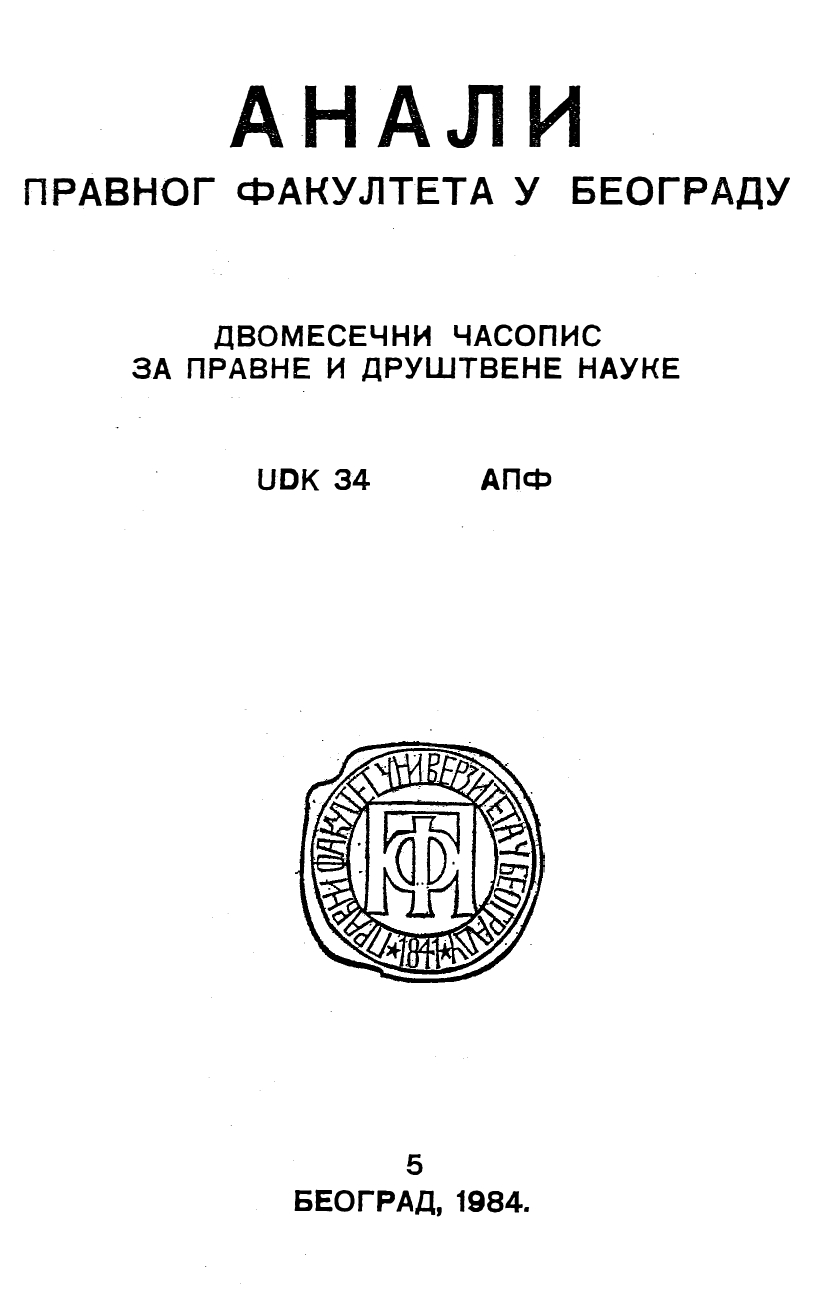ПОЛАЗИШТА ФИЛОЗОФСКОПРАВНОГ СИНТЕТИЗМА TOME ЖИВАНОВИЋА
POINTS OF DEPARTURE OF THE PHILOSOPHICAL AND LEGAL COMPREHENSION OF TOMA ŽIVANOVIĆ
Author(s): Stevan K. VračarSubject(s): Philosophy, Special Branches of Philosophy, Philosophy of Law
Published by: Правни факултет Универзитета у Београду
Summary/Abstract: In the first part of his discussion, which he titled »Indication of certain points of departure«, the author defines philosophical and legal comprehension as an endeavour which is adverse to the ruling analytic conception in legal science, and which is characterised by the process of bringing together of all existing knowledge, predominantly, within the framework of one philosophical and legal standрoint (concept). This is clearly reflected in the very significant and huge, comprehensive work of Toma Živanović. In the text in which he set out his (program) views (in fact the preface to his first book, the »System of Comprehensive Legal Philosophy«, 1921), Toma Živanović determined all points of departure relevant to such a study, indicating also the general construction of his very complex and twofold system, firstly, the comprehensive philosophy of law; secondly, the comprehensive philosophy of legal sciences. Having pointed out certain circumstances which must have made impact of this Živanović’s determination, the author especially explains his results in the comprehension of concepts and knowledge. Živanović does this by application of his method of so-called generalised abstractions. The final result of this approach and undertaking is this very comprehension of positive law, natural law and the idea of law in Živanović’s theory. In the second part of his discussion, titled »Certain characteristics of the indicated points of departure«, the author firstly emphasises the rare talent, the working capacity, devotion to the achievement of set aims, the six decades of continuous work Živanović had spent on his system. But it must be mentioned that he worked in an culturally and scientifically undeveloped environment, so that his comprehensive work embodied the results achieved by the European and world legal science, so far i.e. the traditional jurisprudence. That is why his comprehension has room for the main branches of legal thought, study-investigation, and practical work in the branch of law: positivism as the dominant stream of thought, jus naturate — which had always been the main characteristic of legal philosophy, realism, which was present by way of empirical-sociologistudy of law. Of course, all other streams of thought and results of the traditional jurisprudence have also been subjected to certain comprehensive study in Živanović's system. This had been possible, before all else, because Živanović had not been only a mere compiler or eclectic, but a profound thinker and original, creative scientis, setting forth his own general philosophical view and his own concept of law and jurisprudence, offering numerous original and creative resolutions of key problems (such as the -three-partite theory in criminal law, etc.). Owing to this fact, Živanović has succeeeded in arriving at an amazing and complete system, in which there has been achieved a comprehension of the subject (i.e. that which pertains to the very object of the study), of methodic comprehension (i.e. which is expressed in the applied method of study), and substantial comprehension (i.e. that which has been verified in the achieved results). Consequently, Živanović’s system reflects a union of ontological, gnoseological and axiological problems in the sphere of legal thought. Therefrom are derived the main characteristics of Živanović’s system (extraordinary construction, complexity, variety, coherence etc..) and an enormous originality of Živanović himself, but which has never transformed into any kind of extremizm. In the third part of his discussion, titled »Critical review of the points of departure and the results of Živanović’s comprehension«, the author explains the contradictions within the traditional jurisprudence, unavoidably influencing certain immanent contradictions in Živanović's comprehensive system. Namely, there are in this system elements which correspond to the achievement, but also the’ failures of the tradition al jurisprudence, there are to be found together old results and the novelties of modern legal thought. His comprehension is twofold, showing both comprehensive tendencies in the modern jurisprudence and the personal contributions of T. Živanović himself. Also, the main result of all this is the comprehension of knowledge, construction of a system compatible to the state of thought, and not a real state of affairs in the development of the modern legal system and the State. This is in connection with Živanović's resolution of the main ontological problem relating to law tj. a unification of positive law, jus naturale and the concepts of law. But, the main objection to this would be that there is an obvious diversity in the points of departure for the construction of the threepartite system of criminal law and the construction of the system of comprehensive legal philosophy. The principles of constructions of these two systems are not the same or at least they show considerable diversity. Also another objection could be made due to the omission of knowledge pertaining to the State in a comprehension of this kind. Otherwise, certain critisizm of this comprehension would be justified from the point of view of every analytic theory, including Marxizm. In the last part of the discussion, titled »Conclusion« the author stresses the huge scientific significance and value of Živanović’s study, especially for future and different comprehensive works. Generally speakiing this scientist ranks at the very top of world science, which, at the same time, means that he has invaluable merit in the development of our legal science.
Journal: Анали Правног факултета у Београду
- Issue Year: 32/1984
- Issue No: 5
- Page Range: 617-654
- Page Count: 38
- Language: Serbian

